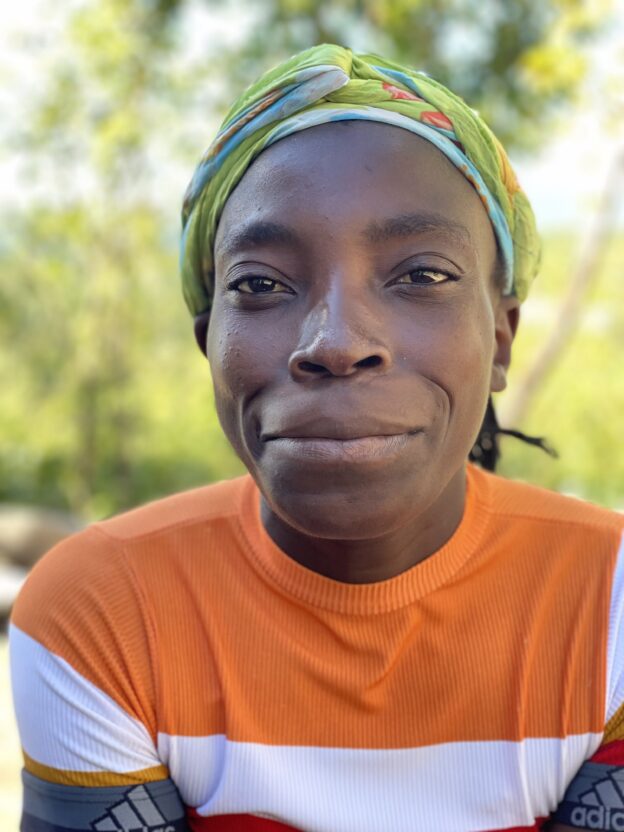Giresline lives well off the main dirt road that cuts through Bedeyenn from Ma Wouj to Answouj and beyond. She and her partner Gracilien have one child together, but she had three children before they ever got together. Her older daughter lives with her mother, who needed a child to help her out, and her older son lives with the boy’s father’s family, though both Giresline and Gracilien would like the boy to come them eventually. Giresline speaks well of Gracilien, “He loves children. If it was up to him, we’d have all of them with us.”
Since they got together, the couple has been living with Gracilien’s mother. They do not yet have a home of their own. Giresline isn’t from the area. She is from Ma Wouj, the major market town in the hills farther up the main road towards the northern coast. “My husband saw me in the market there, and he started talking with me.” The couple has a small plot of land that Gracilien bought with earnings from charcoal-making in the years before he met Giresline, but they have never been able to build a home on it.
With her first CLM investment funds, Giresline set up a small commerce on a table in the front of her mother-in-law’s yard. She sold basic groceries, like rice. But it never worked. “People always bought on credit.”
Her problem is that she is no good at getting people to pay. “I just can’t ask people for money.” When she saw that most of her capital was disappearing, she took what remained, and bought a couple of chickens.
She has now started selling charcoal. She can buy two sacks a week for 600 gourds each and sell them for 1,000 gourds each at the large market in Ma Wouj. She sells it at the market, and there is no question of credit. Her customers have to pay cash. That’s 800 gourds each week, or about $6.15. Gracilien still makes charcoal whenever he can.
With her second transfer of investment funds, Giresline met her case manager at the market, and they bought two goats. She’s excited about the opportunity they present to her. She says that she’ll use the goats to pay for her children’s school. “If they give birth to bucks, I can sell them to pay school fees.”
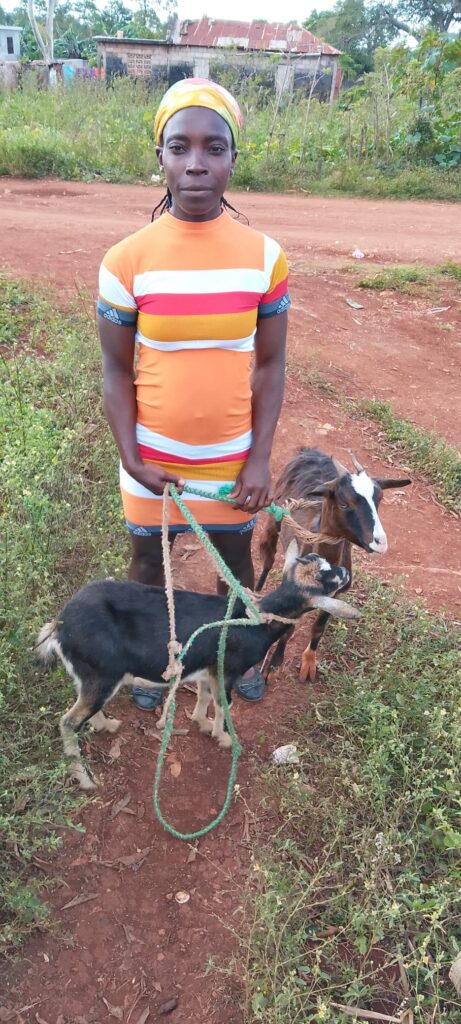
She is most excited, however, about the support the program is giving her to help her and Gracilien finally build a home. They had not yet been able to start construction, even though they had the land. Giresline gets along well with her mother-in-law, but she wants to have a home of her own.
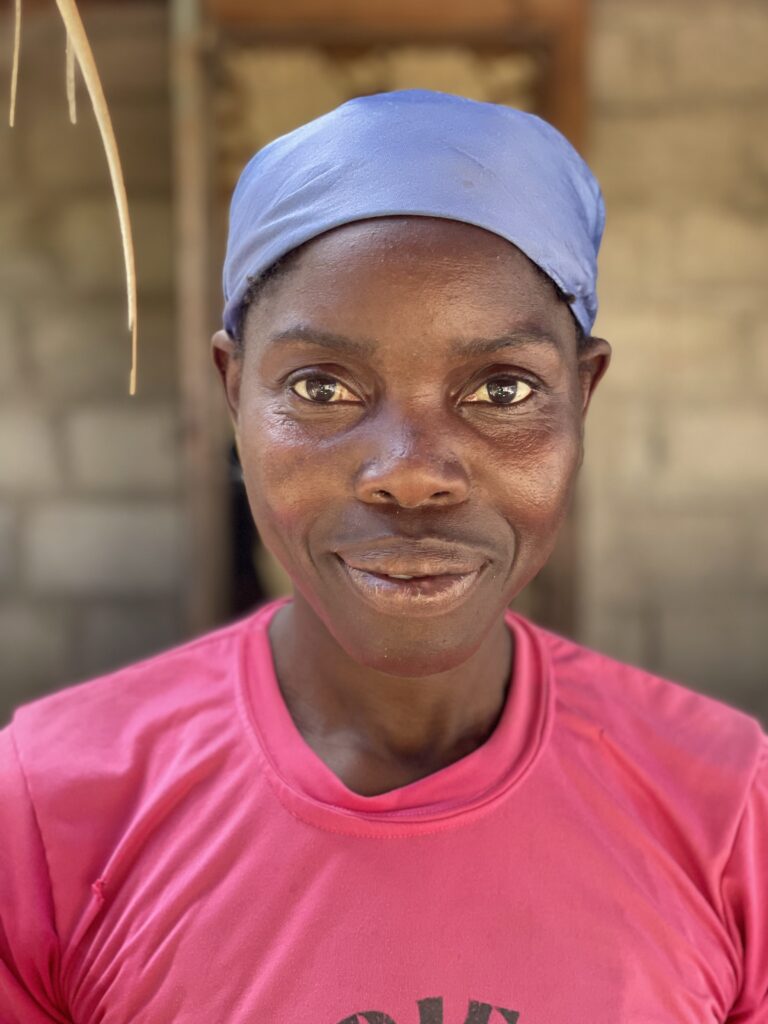
Norelia and her husband Frechenel were doing well. Frechenel earned a steady income for the couple farming, raising livestock, and working as a laborer loading the big trucks that carry all sorts of loads between the lower Northwest and Gonayiv, Haiti’s second city. And the couple needed his steady income. They have eleven children.
But they were able to support them, sending them to school. Just one of the eleven was sent to live away from home with an aunt in Pòtoprens, when the aunt asked for him.
The story of their situation, and the reason they are part of CLM, is clear when one looks at their home. They live in the wide, hilly area between the main road through Bedeyenn and the commune’s small, quiet downtown area. They have their own lakou, or yard, and there are a couple of small structures in it. The principal house is the one they themselves were building with cinder blocks and a poured cement roof, a much more expensive construction than a CLM member would normally be able to afford.
But the home is unfinished. Its walls were never covered with the thin layer of cement that Haitian use to give cinderblock homes a smooth appearance. What’s worse, the couple has not been able to install solid doors. One of the three front doorways is covered by a sheet of roofing metal that’s been nailed in place. The other two doorways, the ones that lead onto the covered porch, are covered with old doors made of scraps of lumber. Something blocked the construction.
In 2023, when they were still working on the home, Frechenel had a stroke. He hasn’t been able to work since then. He spent some time, initially, at the largest local hospital in Jan Rabel, but eventually he and the couple’s oldest daughter moved in with family in Ma Wouj, the market town, where he can get regular physical therapy. Norelia is excited because he is just now about to feed and even dress himself. “He will come back home.”
Since he stopped working, the family has depended entirely on Norelia. Once a week, she borrows a pack animal from a neighbor, walks with the animal to the salt flats in Answouj, where she buys a load of salt for 1,000 gourds. She brings it back to Bedeyenn, and then brings it for sale the next day to Ma Wouj. She can usually sell it for 2,500 gourds, a profit of about $11.50. That is her main source of income to manage her large family.
The map shows her home, a red star marked “Norelia’s Home,” and her locations both for buying and selling, similar stars with labels in red.
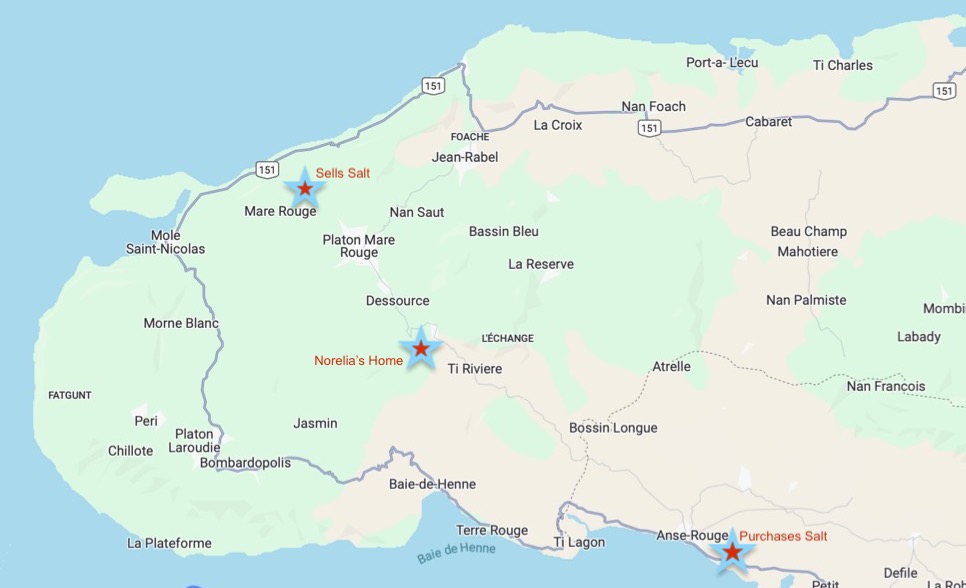
She’s used the funds Fonkoze could invest for her to buy goats. She and her case manager purchased four. One has already given birth to a kid. The other three are pregnant. “Goats are important. They give you a way to manage your problems. When you have a lot of children, you have to have a place to look just in case.”
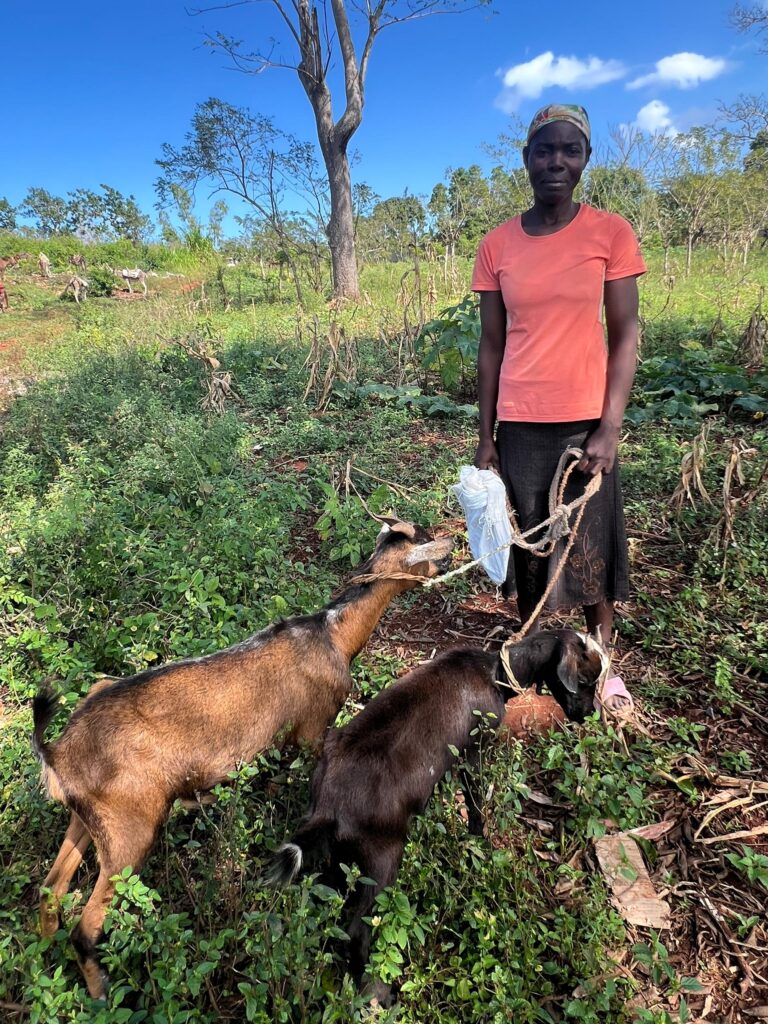
But she would eventually like to establish a larger, more profitable business. She’d like to sell sandals, underwear, stuff that sells especially well, she says, around the holiday season but sells to a degree all around the year. But she’s reluctant to start. She explains that the work on the house’s interior is even less advanced than the outside. There are no interior doors at all. She has no place inside she can secure merchandise, and she explains that, when you have a lot of kids, they and their friends can get into things. As if on cue, her youngest girl opens up her sack of course salt and steals a few small chunks to suck on.
So, Norelia is planning with her case manager to use her home repair budget to finish work on the house that she and Frechenel started. Once she has a room within it that she can lock, she plans to start buying merchandise to start her new business. She would eventually like to buy a pack animal, even if only a donkey, because going to the various markets her work takes her to will be much easier and more profitable when she has one of her own.
